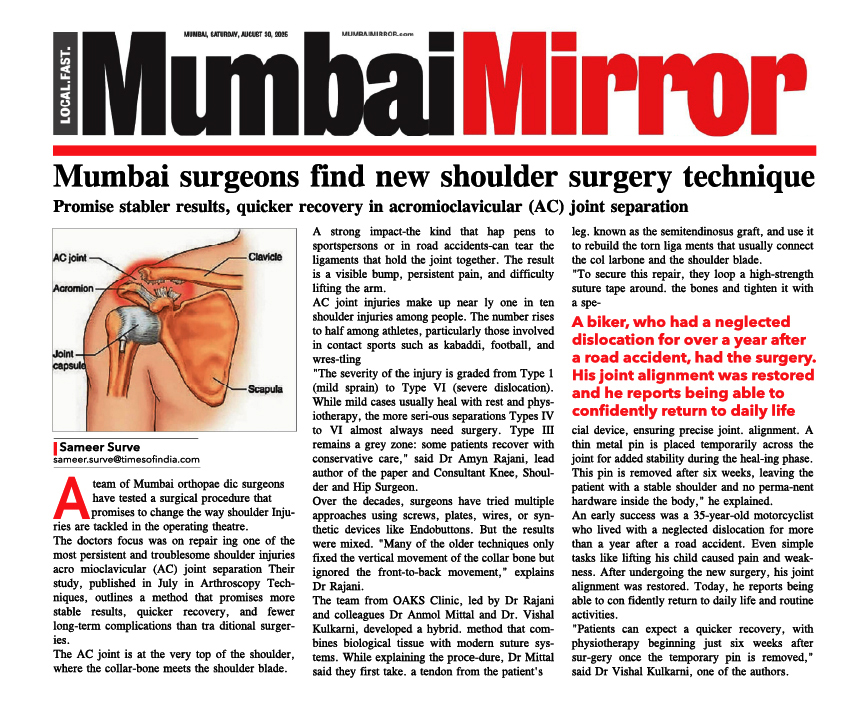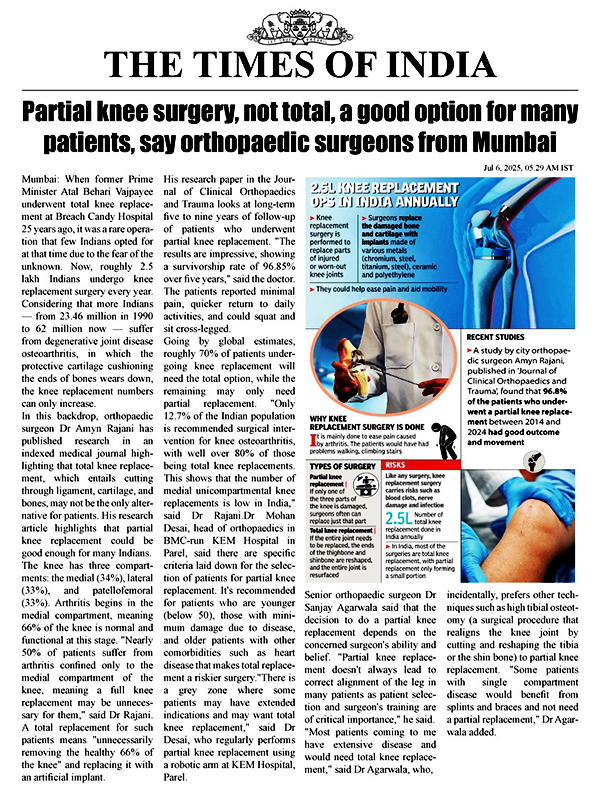Anterior Cruciate Ligament (ACL) injuries are common among athletes and active individuals. When the ACL tears, it often requires surgical intervention to restore knee stability and function. In recent years, Bio-ACL reconstruction has emerged as a promising alternative to traditional ACL reconstruction techniques. But how does it compare, and is it truly a game-changer?
This comprehensive guide explores Bio-ACL vs. traditional ACL reconstruction, their differences, benefits, and which option might be best for you. If you're considering ACL reconstruction surgery in Mumbai, understanding these options is crucial for making an informed decision.
What is Traditional ACL Reconstruction?
Traditional ACL reconstruction involves using a graft to replace the torn ACL. The graft can be harvested from the patient’s body (autograft) or a donor (allograft). The procedure involves drilling tunnels in the femur and tibia to secure the graft, which eventually integrates with the surrounding tissue.
Key Features:
- Common grafts: Hamstring, patellar tendon, quadriceps tendon
- Extensive rehabilitation required
- Long-term durability with proper healing
What is Bio-ACL Reconstruction?
Bio-ACL reconstruction is a newer technique that promotes natural healing of the torn ACL instead of completely replacing it. The procedure involves using a bio-enhanced scaffold or tissue engineering to encourage the body to regenerate the ligament tissue naturally.
Key Features:
- Encourages natural tissue regrowth
- Reduces donor site morbidity
- Potentially faster recovery
Bio-ACL reconstruction is gaining attention among orthopaedic surgery specialists in Mumbai for its innovative approach to ligament healing.
Key Differences Between Bio-ACL and Traditional ACL Reconstruction
|
Aspect
|
Traditional ACL Reconstruction
|
Bio-ACL Reconstruction
|
|
Procedure Type
|
Graft-based replacement
|
Bio-enhanced healing
|
|
Tissue Involvement
|
Uses harvested tissue
|
Encourages natural regrowth
|
|
Recovery Time
|
Longer due to tissue integration
|
Potentially faster recovery
|
|
Invasiveness
|
More invasive due to graft use
|
Less invasive with bio-scaffold
|
|
Durability
|
Proven long-term results
|
Still under long-term study
|
Pros and Cons of Each Technique
Traditional ACL Reconstruction Pros:
- Long-term success and durability
- Suitable for severe tears
- Widely accepted and available
Traditional ACL Reconstruction Cons:
- Longer recovery time
- Donor site morbidity (pain at graft site)
- More invasive
Bio-ACL Reconstruction Pros:
- Minimally invasive
- Encourages natural healing
- Reduced donor site complications
Bio-ACL Reconstruction Cons:
- Limited long-term data
- May not be suitable for severe tears
Which Procedure is Best for You?
The choice between Bio-ACL and traditional ACL reconstruction depends on several factors:
- Severity of the Injury:
- For complete ACL tears, traditional reconstruction may be more reliable.
- Partial tears or less severe injuries may benefit from Bio-ACL techniques.
- Activity Level:
- Athletes or highly active individuals may benefit from the durability of traditional ACL reconstruction.
- Recovery Expectations:
- If faster recovery and minimal invasiveness are priorities, Bio-ACL may be preferred.
- Age and Overall Health:
- Younger patients with good healing capacity may be ideal candidates for Bio-ACL.
Consulting a knee specialist in Mumbai is crucial to assess your individual needs and choose the most suitable procedure.
Recovery Process: Bio-ACL vs. Traditional ACL
Traditional ACL Reconstruction Recovery:
- Initial immobilization followed by gradual physiotherapy
- Return to sports in 6-9 months
- Higher focus on graft integration and healing
Bio-ACL Reconstruction Recovery:
- Faster initial recovery due to less invasive techniques
- Emphasis on natural ligament regeneration
- Return to sports in 4-6 months (pending further research)
Success Rates and Long-Term Outcomes
Traditional ACL Reconstruction:
- Proven long-term success with proper rehabilitation
- Graft failure rates around 5-10%
Bio-ACL Reconstruction:
- Promising early results
- Long-term data still emerging
Cost Comparison: Bio-ACL vs. Traditional ACL
The cost of ACL tear surgery in Mumbai can vary based on the technique chosen. Bio-ACL procedures may be more expensive due to the advanced materials and techniques involved, while traditional ACL surgery remains more widely available and affordable.
Why Consulting a Specialist Matters
Choosing between Bio-ACL and traditional ACL reconstruction is a significant decision that requires expert guidance. A skilled joint replacement specialist in Mumbai can evaluate your condition and recommend the best surgical approach for your needs.
Meet Dr. Amyn Rajani – Leading Knee Specialist in Mumbai
If you're considering ACL reconstruction surgery in Mumbai, Dr. Amyn Rajani is a renowned knee specialist with expertise in both Bio-ACL and traditional ACL reconstruction techniques. As a trusted orthopaedic surgery specialist in Mumbai, Dr. Rajani is dedicated to providing personalized treatment plans that ensure optimal recovery and long-term knee health. Schedule a consultation today and take the first step toward a pain-free, active lifestyle.
Book your consultation today and take the first step towards pain-free mobility!
Location: OAKS Clinic, Mumbai: https://g.co/kgs/f4L4sNS
Contact: 91-88989 75355 / 91-22-23619137





